St. John's Wort Blu-ray Movie
HomeSt. John's Wort Blu-ray Movie 
弟切草 / OtogirisoArrow | 2001 | 85 min | Rated R | No Release Date
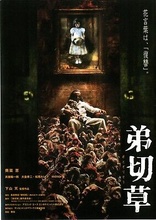
Price
Movie rating
6.1 | / 10 |
Blu-ray rating
| Users | 0.0 | |
| Reviewer | 3.0 | |
| Overall | 3.0 |
Overview
St. John's Wort (2001)
Nami has been creating artwork for a new video game based on images she's been seeing in her dreams. With one of the game producers, she travels out to an abandoned house that seems to match her visions. As they explore the old mansion, Nami begins to have more visions of a forgotten childhood, until at last she comes across a photo of twin infants, labelled "Nami" and "Naomi". As Nami and the producer go from room to room, an unseen person seems to be watching them from a hidden room.
Starring: Megumi Okina, Y˘ichir˘ Sait˘, K˘ji Ohkura, Reiko Matsuo (I), Minoru TeradaDirector: Ten Shimoyama
| Foreign | Uncertain |
| Horror | Uncertain |
Specifications
Video
Video codec: MPEG-4 AVC
Video resolution: 1080p
Aspect ratio: 1.78:1
Original aspect ratio: 1.75:1
Audio
Japanese: DTS-HD Master Audio 5.1
Japanese: LPCM 2.0
Subtitles
English
Discs
Blu-ray Disc
Single disc (1 BD)
Playback
Region A (B, C untested)
Review
Rating summary
| Movie | 3.0 | |
| Video | 3.0 | |
| Audio | 3.5 | |
| Extras | 2.0 | |
| Overall | 3.0 |
St. John's Wort Blu-ray Movie Review
Reviewed by Jeffrey Kauffman October 23, 2024 Note: This film is available on Blu-ray as part of the
J-Horror Rising set from Arrow Video.
When a set like J-Horror Rising offers someone like the venerable Tom Mes freely detailing how at least some elements that combined to
create what is commonly
called J-Horror (at least vis a vis J-Horror as it's about to be defined, below) might be likened to American B movies or even direct to
video or made for television efforts, there may be a bit of a subliminal
warning
to be gleaned,
all of which is to say, perhaps expectations need to be reasonably set when approaching some and potentially all of the films in this set. Mes
unabashedly lists Ringu (the original Japanese Ring film, for the uninitiated)
as
a defining J-Horror
landmark, at least within the context of the films offered here, in that none of these films probably could be imagined and almost certainly wouldn't
have been made without the influence of the celebrated Hideo Nakata outing. It's also salient to note that several of the films in this collection
were
first exhibited as the "down ticket" item on "double features", sometimes not so coincidentally under main attractions like Ringu 2 and/or
Ringu 0. As Mes overtly mentions in his overview of J-Horror included in this set, the wake left by Ringu was wide, but it
wasn't particularly deep, at least as evidenced by how quickly this particular "rage" ebbed, and so as such even the Rising part of the title
of
this collection might be slightly misleading, since as Mes describes, by the time these offerings came along, things may have already been fading.
Note: Those interested in this release may want to also check out Daiei Gothic: Japanese Ghost Stories, from Radiance, which is streeting the same day as this
collection.
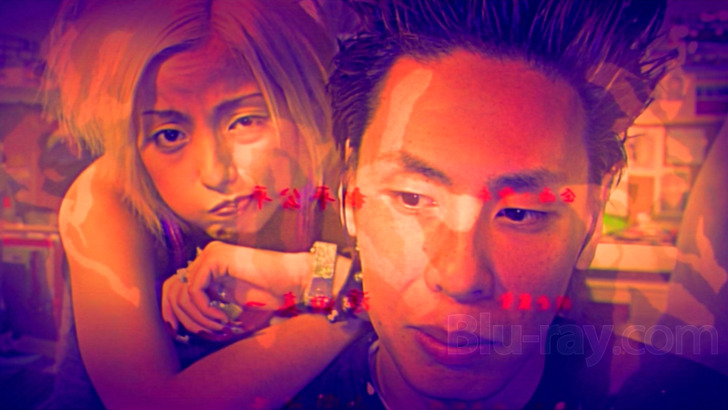
St. John's Wort is a very colorful yellow flower that has become renowned for some supposed healing properties. Healing is probably less on the menu in this particular St. John's Wort than mere survival, but the colorful aspect of the titular flower (at least in one version of the film's title) is more than amply on display, as some of the screenshots I've uploaded to accompany this review will hopefully help to delineate. I don't think St. John's Wort is supposed to have hallucinogenic properties, but there's certainly a quasi-pychedelic ambience running through this film, which is a kind of odd mashup of VR adjacent material, courtesy of a videogame that's being developed, as well as a haunted house mystery, courtesy of a plot that sees two of the videogame's creative crew, Nami (Megumi Okina) and Khohei (Yoichiro Saito), visiting an apparently abandoned (yeah, right) dilapidated mansion that Nami has inherited.
There's some passably interesting material here, and a certain "meta" flair element that's evident as characters are more or less thrust into a videogame, both figuratively and seemingly literally (kind of a la Tron ), but it frankly may be the film's style more than anything that really stays with the viewer. The film flirts with found footage tropes, attempting to work that basic idea into a supposedly "higher tech" conceit whereby Nami and Khohei's "adventures" in the house become grist for the designing mill of videogame constructors, but this is another ostensible "J-Horror" outing that may be decidedly light on actual scares.
St. John's Wort Blu-ray Movie, Video Quality 
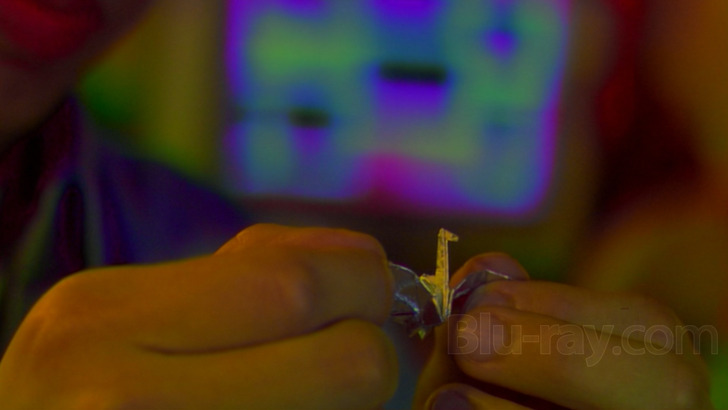
St. John's Wort is presented on Blu-ray courtesy of Arrow Video with an AVC encoded 1080p transfer in 1.78:1. Arrow's insert booklet contains the following minimal information on the transfer:
The films in this collection were remastered in high definition and supplied by Kadokawa.Something as intentionally stylized as this film tends to evade our normal metrics of analysis, but that said, this offers an unavoidably heterogeneous appearance a lot of the time, simply due to different technologies (or supposed technologies, like closed circuit video feeds) and especially some of the filtering and grading going on. Even supposedly "normal" scenes tend to have a somewhat sickly yellow-green cast to them, something that's especially noticeable in flesh tones. Less "normal" moments have almost fluorescently blooming colors on display, with chartreuses and oranges clashing with each other, but often with an at least somewhat similar yellowish tint pervading the image. Detail levels are highly variable depending on bells and whistles employed.
St. John's Wort is presented in 1.85:1 [sic] with 5.1 and stereo sound. Additional remastering work was completed by R3Store Studios, London.
St. John's Wort Blu-ray Movie, Audio Quality 
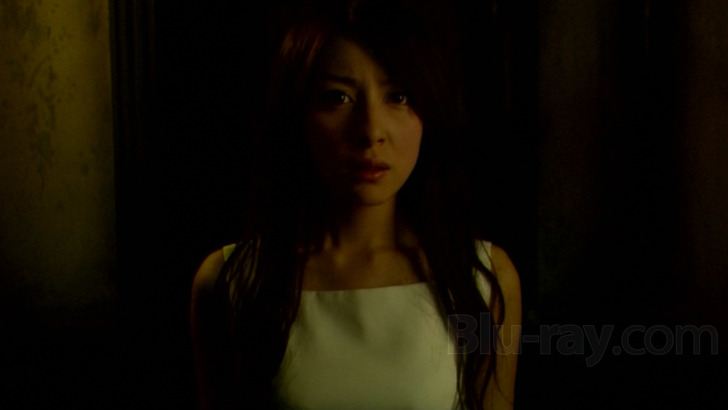
St. John's Wort features either DTS-HD Master Audio 5.1 or LPCM 2.0 options in the original Japanese. Despite the film's apparently miniscule budget, there's been some attention paid to sound design, and as such the surround track can definitely show more directionality as well as some well placed sound effects. A couple of startle effects are more pronounced in the surround version, at least due in part to discrete channelization. Scoring is also effective and provides a wash of underlying sound in the side and rear channels. Dialogue is rendered cleanly and clearly throughout. Optional English subtitles are available.
St. John's Wort Blu-ray Movie, Special Features and Extras 
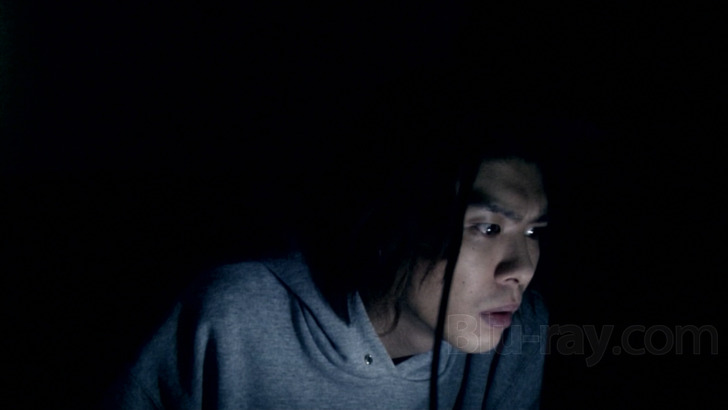
- Audio Commentary by Amber T.
- The Making of St. John's Wort (HD; 21:51) is subtitled in English.
- Archive On Set Introduction by Megumi Okina (HD; 00:44) is subtitled in English.
- Archive Interviews are subtitled in English:
- Archive Interview with Megumi Okina (HD; 17:39)
- Archive Interview with Koichiro Saito (HD; 19:50)
- Archive Interview with Reiko Matsuo (HD; 4:24)
- Archive Interview with Koji Okura (HD; 4:56)
- Trailers and TV Spots
- Inugami and St. John's Wort TV Spot (HD; 00:22)
- St. John's Wort TV Spot 1 (HD; 00:11)
- St. John's Wort TV Spot 2 (HD; 00:28)
- St. John's Wort Trailer (HD; 00:37)
- Image Gallery (HD)
St. John's Wort Blu-ray Movie, Overall Score and Recommendation 
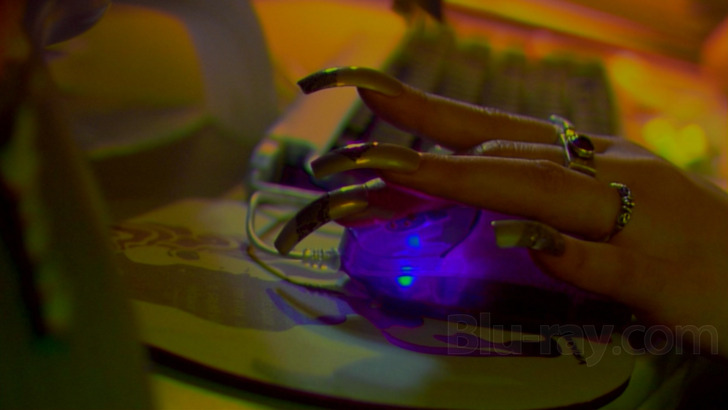
St. John's Wort never quite "got there" for me, but I was still often fascinated by its almost drug fueled visuals. While those very visuals make the video side of things a bit hard to properly analyze in a "traditional" way, technical merits are generally solid and the supplements enjoyable, for anyone who might be considering making a purchase.
Similar titles
Similar titles you might also like
(Still not reliable for this title)

Persona
仮面学園 / Kamen gakuen
2000

Isola: Multiple Personality Girl
ISOLA 多重人格少女 / Tajuu jinkaku sh˘jo
2000

Shikoku
死国
1999

Inugami
狗神
2000

Carved: The Slit-Mouthed Woman
口裂け女 / Kuchisake-onna
2007

Noroi: The Curse
ノロイ / Noroi
2005

Red to Kill
Yeuk saat | Ru˛ shā | 弱殺 | Limited Collectorĺs Edition Slipcover #1
1994

Lake of Dracula
Noroi no yakata: Chi o suu me
1971

Panic Beats
Latidos de pßnico / Frantic Heartbeat
1983

Bloodlust
Mosquito - Der Schńnder
1977

Audition
オーディション | ďdishon | Special Edition
1999

Rape Zombie: Lust of the Dead
Reipu zonbi: Lust of the dead
2012

The Horrible Sexy Vampire
El vampiro de la autopista / Standard Edition
1972

Miss Zombie
2013

Ju-on: The Grudge 2
Ju-on 2
2003

Love Brides of the Blood Mummy
1973

The Hungry Snake Woman
Standard Edition | Petualangan Cinta Nyi Blorong
1986

The Strange Case of Dr. Jekyll and Miss Osbourne
Docteur Jekyll et les femmes
1981

Veerana: Vengeance of the Vampire
Standard Edition
1988

Dial D for Demons
Taan shiu hung chow / TÓn shāo xiōng zh˛u / 炭燒凶咒
2000